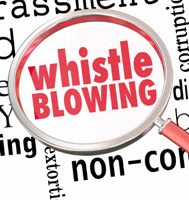What Does it Mean to Be a Whistleblower Under the Florida Private Whistleblower Act?

What does it mean to be a whistleblower in Florida against your private-employer? And more specifically, how is a whistleblower defined under the Florida Private Sector Whistle-Blower’s Act (Florida Statutes Section 448.102)?
Florida has two separate statutes designed to protect whistleblowers—one designed to protect public employees, and a second designed to protect employees in the private sector. In this article, we focus on employees blowing the whistle against their private sector employers. However, the elements for a whistleblower claim, and the ways to bring your whistleblower claim, are different for public employees than they are for private employees, which we discuss here. If you work for a Florida public employer and think there may be illegal activities going on, or if you have blown the whistle and are suffering retaliation, it is important that you consult with an experienced employment law attorney to help answer your questions.
What is a Whistleblower?
As explained in this article in the University of Miami Law Review, whistleblowing generally is defined as “the act of a man or woman who, believing that the public interest overrides the interest of the organization he serves, publicly ‘blows the whistle’ if the organization is involved in corrupt, illegal, fraudulent, or harmful activity.” In other words, whistleblowers are individuals who provide information about illegal or otherwise harmful acts occurring at their places of employment. In the Florida Private Sector, these employees who blow the whistle are protected under Fla. Stat. 448.102.
How Does the Florida Statute Define a Whistleblower in the Private Sector?
The Florida statute that protects whistleblowers in the private sector makes clear what a whistleblower is by clarifying what kinds of actions (by an employee) cannot produce a retaliatory response from the employer. There are three different prongs to the Florida Private Whistleblower Act – or three ways for an employee to have protection under the law. Those are that an employer cannot take retaliatory personnel action against an employee who engages in any of the following::
-
Disclosed, or threatened to disclose, to any appropriate governmental agency, under oath, in writing, an activity, policy, or practice of the employer that is in violation of a law, rule, or regulation;
-
Provided information to, or testified before, any appropriate governmental agency, person, or entity conducting an investigation, hearing, or inquiry into an alleged violation of a law, rule, or regulation by the employer; and/or
-
Objected to, or refused to participate in, any activity, policy, or practice of the employer which is in violation of a law, rule, or regulation.
Limitations of the Protections for Whistleblowers in the Private Sector
Can anyone who works in the private sector expect to be protected under the statute we discussed above in the event that employee becomes a whistleblower? There are limitations. Most notably, under Florida Statutes Section 448.101, which provides definitions, an “employer” is defined as “any private individual, firm, partnership, institution, corporation, or association that employs ten or more persons.” In other words, when Florida statutory law says that an employer cannot retaliate against an employee in the private sector, that law presumes that the employer is a person or entity that employs ten or more people.
What does this mean for a whistleblower at a very small private company? Florida case law that has interpreted the Florida Private Sector Whistle-Blower’s Act has not expressly emphasized that, in order to be protected against retaliation, an employee must work for an employer with 10 or more employees.
A Florida Whistleblower Lawyer Can Help
Do you have questions about what it means to be a whistleblower and whether the statute applies to you? A Florida whistleblower attorney can assist you. Contact an experienced employment law attorney with questions.
Resources:
leg.state.fl.us/Statutes/index.cfm?App_mode=Display_Statute&Search_String=&URL=0400-0499/0448/Sections/0448.102.html
leg.state.fl.us/Statutes/index.cfm?App_mode=Display_Statute&Search_String=&URL=0400-0499/0448/Sections/0448.101.html

